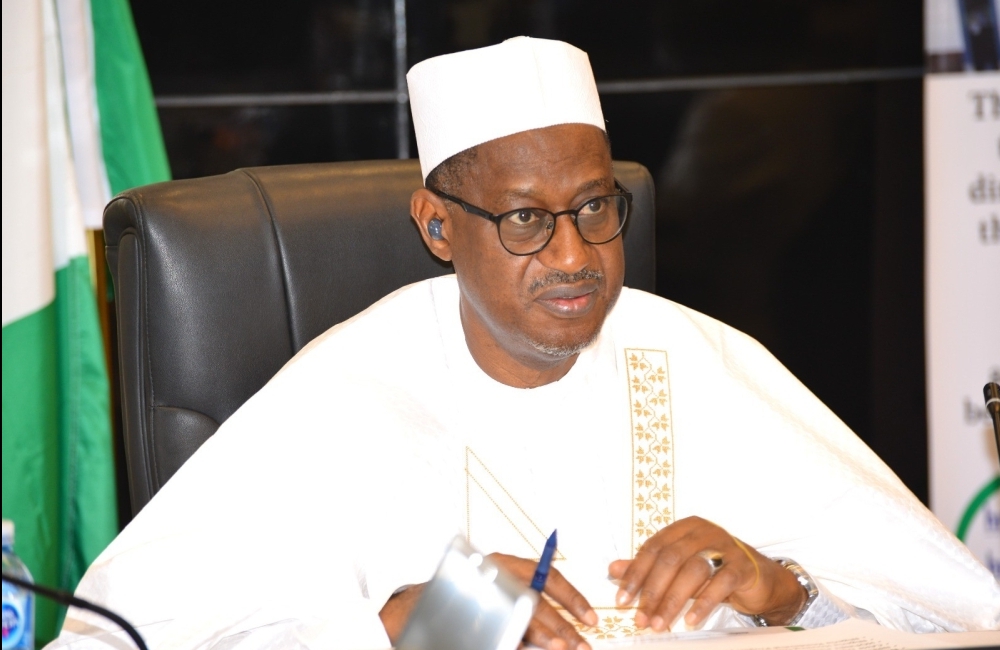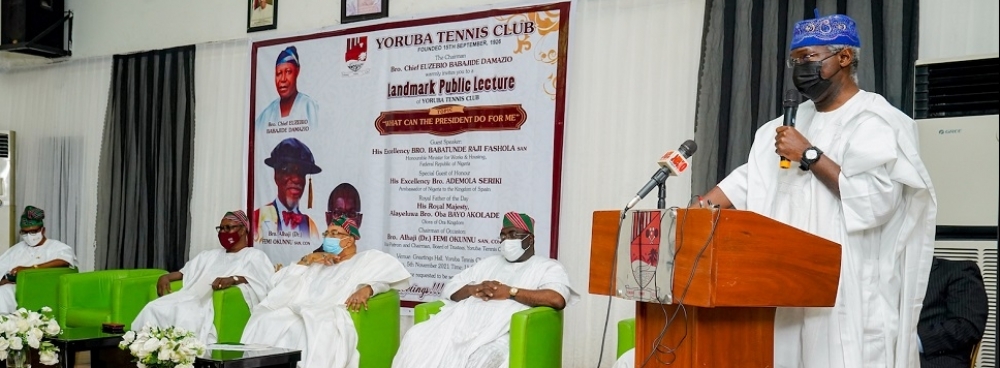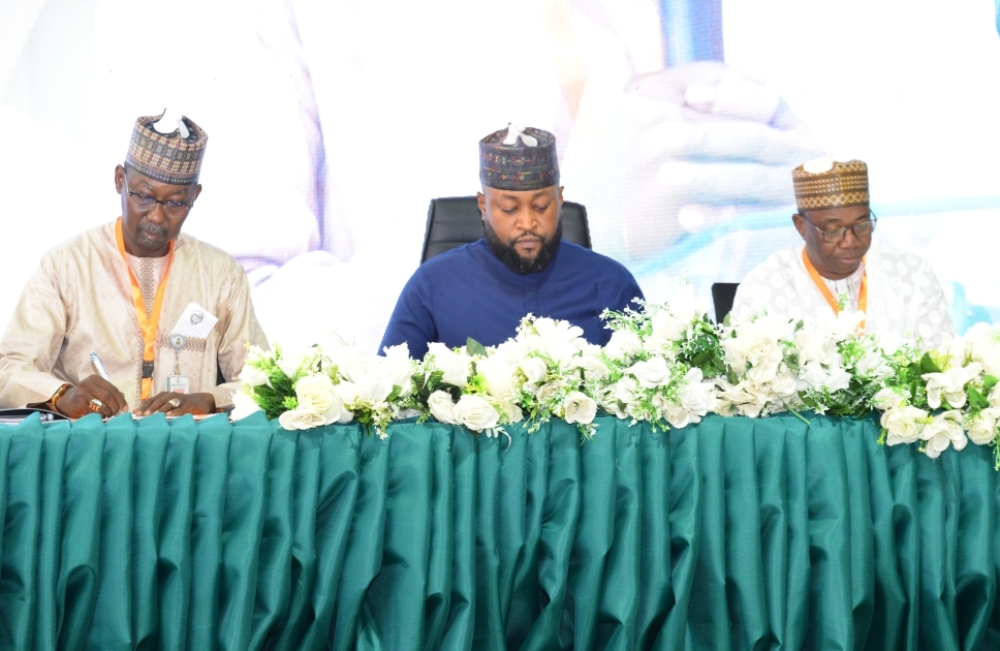THE KEYNOTE SPEECH BY H.E BABATUNDE RAJI FASHOLA, SAN AT THE EKITI STATE UNIVERSITY ALUMNI ASSOCIATION 2021 GENERAL ASSEMBLY AND CONVENTION LECTURE
Ladies and Gentlemen,
Let me start my speech by thanking you for inviting me to be your guest speaker at your convention for this year.
I sincerely hope that this year’s convention is not only successful but extremely rewarding of the efforts that have gone into arranging it.
The history of Alumni Associations of universities is quite dated and well reported and you have become part of a global network of similar associations who have contributed to enriching the human civilisation worldwide.
I however have some concerns about the negative presumption in the title you have selected, which is “Tragedy of leadership without legacy; Safeguarding the next generation of Nigerian leaders.”
I prefer to always see my glass and that of Nigeria as half full and not half empty.
In this regard, I look for triumphs and not tragedies.
So, let me share with you a triumph and a legacy.
Up until 21st of March 1982, there was no state university in the old Ondo state and there was no Ekiti state as a legal entity. Indeed, the idea that an Ekiti state would one day own a university was not in contemplation.
But all of these changed on the 22nd of March 1982 by the action of Chief Michael Adekunle Ajasin, as the Governor of the then Ondo state, when he created the Ondo State University.
That was an act of leadership, to create an institution of higher learning to prepare the next generation and make them ready to lead.
That action was triumphant and not tragic.
And it would seem that the then Ondo state university was a worthy legacy that any leader in the public or private sector would be proud of.
But the triumphs and legacies did not stop there.
To the credit of the Babangida Administration and in response to the yearnings of the people of Ekiti who were then part of Ondo State, Ekiti state was birthed as a legal entity in 1996.
It is extremely doubtful that if a referendum were held today to return Ekiti to become part of the old Ondo state, that such a referendum will find majority support if it finds any support at all.
The reason why such a referendum will almost certainly fail, if it ever emanates in the first place, is that the people of Ekiti are proud of their state.
That is a legacy, and I dare say, a triumph, not a tragedy of leadership.
Yes, there are those who at the time did not want the military to remain and I am one of them, but we cannot dismiss something as worthy as Ekiti state, because we dislike those who produced it or the system by which they did it.
It might interest you to find out how the law that finally abolished slavery in America was passed and the efforts of Abraham Lincoln to get parliamentary support for it.
The process by which the support of the law makers was obtained for the Abolition Law are not necessarily worthy of badges of honour, but the abolition of slavery, the freedoms they delivered for the human mind and dignity remain enduring and triumphant legacies of leadership.
Some of you may be aware of the Battle of Normandy. This was the last push of a global coalition in 1944 to stop a German advance on Europe and by extension the whole world.
Recent declassification of military records now reveals that it was not just bravery alone that won the contest.
But the legacies of freedom that the triumph of the coalition forces delivered is with us today.
The aftermath of that effort led to the birth of the United Nations and the prescription of a new global legal order that has regulated the conduct of human affairs till today.
Away from history and back to Ekiti, the triumphs do not end, and the legacies continue.
One of them is the Alumni Association whose guest I am today. Without Ekiti State, and without Ekiti State University, from where would an alumni association of an Ekiti State University sprung forth?
So, to you my dear brothers and sisters, do away with negativity, look for possibilities, acknowledge little and modest successes, and let us work together to build for a better tomorrow.
Those who propel us to think negatively are not only thinking positively and acting positively, they are benefiting from our negativities. Therefore, I urge you to seek to do good things for a good reason not because we want to correct a bad thing.
For too long, our developmental aspirations have been anchored on “correcting what was wrong” when it can be anchored on an aspiration for self-improvement.
As someone once put it, we should not delegitimize in order to legitimize.
So for example, a Government in office, should build a waterworks for the people not because it has never been built before or because the previous government failed to build it, but because water is life, water is good for sanitation and for health care and water promotes wellness.
Therefore, at a recent event where I was invited to speak about the role of private sector in funding infrastructure gap and housing deficit, I modified the subject by removing “gap” and “deficit” from the topic.
I did so for a couple of reasons not least of which is the negativity that I perceived about those words and my subject.
I did so in part because I am aware that every part of the world is committing to building more infrastructure and housing because it helps the economy, and it creates jobs and not because they want to fill the “gap” or bridge a “deficit.”
I did so also because I know that President Buhari’s investment in infrastructure and housing is not meant to fill a gap or bridge a deficit; but to grow the Nigerian economy to global competitiveness and to invest in the Nigerian people.
Therefore, we must not only acknowledge what has been done by those before us, we as the leaders of today must embrace our responsibility to safeguard the next generation of Nigerian leaders.
We must then ask ourselves what we can do, to improve on the triumph of the legacy of Chief Michael Ajasin, in order to prepare the future for our children and our children’s children.
In this regard, we must be aspirational, forward-looking and ready to take responsibility for what happens in one generation.
If we keep looking backwards, we will be looking for who to blame. The energy spent in looking for “scapegoats” and there are none, can be spent visioning and planning for tomorrow.
So let us look at today and what we have, in order to possibly project what we will need and prepare how to do them.
In this regard I can only offer suggestions as I do not profess to have all the ideas or answers.
But a good starting point is to accept that our world is changing and will continue to change. Therefore, we must prepare to adapt in order to safeguard the next generation.
At the onset of the industrial revolution, the subsequent discovery of crude oil and its amenability to being refined was the Holy Grail of that period.
It birthed a new economy of high-powered petrol and diesel driven machines that created global prosperity.
That is going away now as the world commits to a Net Zero carbon world from around 2050 and beyond. That is one generation away and we must prepare.
We must prepare by getting ready to acquire skills that will be useful to thrive in a Net Zero carbon environment and build our prosperity away from the carbon environment.
Another area is financial services. When last did you write a cheque? That was the ultimate symbol of financial inclusion or the ownership of a passbook, for those with savings accounts.
All of that is gone, many jobs have been lost with the disappearance of cheque books and replaced, but we still undertake financial transactions using different skills.
Bitcoins, cryptocurrency and of course our E-Naira are the new faces of financial transactions. To quote a popular saying in an adapted form - What will we think of next and how ready are we?
Of course, I cannot but discuss my personal passion which is Sports.
In about two generations, a pastime has become a profession that supports lives and livelihoods across the world among young people in the main, who are now professional sports men and woman.
A massive economy has been built around it including innovation, research and development for equipment, medicine, nutrition and officiating.
The sports that our parents told us was for “never do wells” is not only a major income earner globally, it is a source of projecting global sovereign strength.
Our plan for the next generation must include preparing our children to proudly deploy their skills in a professional way in the sporting arena.
While sports has struggled, the other sides of the talent based vocation such as music, dance, theatre and arts are prospering in varying degrees.
We must prepare the next generation to multiply the gains and consolidate on the success of today.
There are many things that we need to do and this occasion and the time permitted, do not lend themselves to an exhaustive consideration of those things.
But one thing that this occasion lends itself to, and which time permits us to do, is that this convention can (and I recommend that it must) be used to liberate our minds.
We must at this convention resolve to unshackle our minds from negativity, and embrace positive and aspirational thoughts.
After all, we can only do things that we can think of.
Therefore, the greatest bequest we can give the next generation is a gift of a belief in possibilities. If we do not believe how can we pass it on?
I do, I believe in the endless possibilities of Nigeria. What about you?
I acknowledge the triumphs and legacies of many who came before me, and even if I criticize some of their choices, I do not disown the foundations they contributed to where I stand today.
I am resolved to improve on what I inherited and pass it on to those who will come after me. This in part explains why the Federal Government through the Ministry of Works and Housing is undertaking repairs and reconstruction of internal Roads in 44 Tertiary institutions and the list of beneficiaries is growing.
What about you? What are you prepared to do to improve on what you inherited?
Thank you once again for inviting me. Thank you for listening.
Babatunde Raji Fashola, SAN
Honourable Minister of Works and Housing















